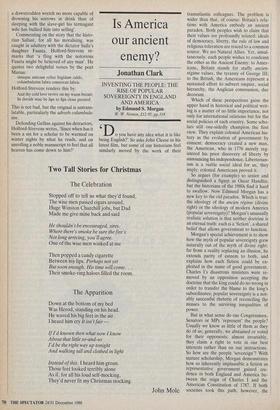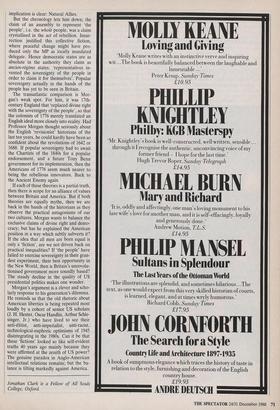Is America our ancient enemy?
Jonathan Clark
INVENTING THE PEOPLE: THE RISE OF POPULAR SOVEREIGNTY IN ENGLAND AND AMERICA by Edmund S. Morgan
W. W. Norton, £12.95, pp.318
Do you have any idea what it is like being English?' So asks John Cleese in his latest film, but some of our historians feel similarly moved by the work of their transatlantic colleagues. The problem is wider than that, of course: Britain's rela- tions with America embody an ancient paradox. Both peoples wish to claim that their values are profoundly related: ideals of democracy, liberty, the rule of law and religious toleration are traced to a common source. We are Natural Allies. Yet, simul- taneously, each people wishes to condemn the other as the Ancient Enemy: to Amer- icans, Britain stands for stuffy ancien- regime values, the tyranny of George III; to the British, the Americans represent a sustained effort to subvert empire, social hierarchy, the Anglican communion, due decorum.
Which of these perspectives gains the upper hand in historical and political writ- ing is a matter of no little importance, not only for international relations but for the social policies of each country. Some scho- lars still one-sidedly champion the first view. They explain colonial American his- tory as the evolution of government by consent: democracy created a new man, the American, who in 1776 merely reg- istered his prior discovery of liberty by announcing his independence. Liberterian- ism is a viable social ideal for us, they imply: colonial Americans proved it.
So argues (for example) so senior and distinguished a figure as Oscar Handlin; but the historians of the 1980s find it hard to swallow. Now Edmund Morgan has a new key to the old paradox. Which is true: the ideology of the ancien regime (divine right) or the ideology of modern America (popular sovereignty)? Morgan's unusually realistic solution is that neither doctrine is an eternal truth: each is a 'fiction', a shared belief that allows government to function.
Morgan's special achievement is to show how the myth of popular sovereignty grew naturally out of the myth of divine right: far from a reality replacing an illusion, he extends parity of esteem to both, and explains how each fiction could be ex- ploited in the name of good government. Charles I's disastrous ministers were re- moved by an opposition accepting the doctrine that the king could do no wrong in order to transfer the blame to the king's subordinates; popular sovereignty is a not- ably successful rhetoric of reconciling the masses to the surviving inequalities of power.
But in what sense do our Congressmen, Senators or MPs 'represent' the people? Usually we know as little of them as they do of us; generally, we abstained or voted for their opponents; almost invariably, they claim a right to vote in our best interests rather than on our instructions. So how are the people 'sovereign'? With mature scholarship, Morgan demonstrates how so inherently implausible a fiction as representative government gained cre- dence in both England and America be- tween the reign of Charles I and the American Constitution of 1787. If both societies took this path, however, the implication is clear: Natural Allies.
But the chronology lets him down; the claim of an assembly to represent 'the people', i.e. the whole people, was a claim crystallised in the act of rebellion. Insur- rection justified this collective fiction, where peaceful change might have pro- duced only the MP as locally mandated delegate. Hence democratic states are as absolute in the authority they claim as ancien-regime states: 'representatives in- vented the sovereignty of the people in order to claim it for themselves'. Popular sovereignty actually in the hands of the people has yet to be seen in Britain.
The transatlantic comparison is Mor- gan's weak spot. For him, it was 17th- century England that 'replaced divine right with the sovereignty of the people', so that the colonists of 1776 merely translated an English ideal more closely into reality. Had Professor Morgan thought seriously about the English 'revisionist' historians of the last ten years, he could hardly have been so confident about the revolutions of 1642 or 1688. If popular sovereignty had to await the Chartists of the 1840s for a popular endorsement, and a future Tony Benn government for its implemention, then the Americans of 1776 seem much nearer to being the rebellious innovators. Back to the Ancient Enemy again.
If each of these theories is a partial truth, then there is scope for an alliance of values between Britain and America. But if both theories are equally myths, then we are back in the hands of the historians as they observe the practical antagonisms of our two cultures. Morgan wants to balance the exclusive claims of divine right and demo- cracy; but has he explained the American position in a way which subtly subverts it? If the idea that all men are born equal is only a 'fiction', are we not driven back on practical inequalities? If 'the people' have failed to exercise sovereignty in their gran- dest experiment, their best opportunity in the New World, then is Britain's unrevolu- tionised government more soundly based? The steady decline in the quality of US presidential politics makes one wonder.
Morgan's argument is a clever and scho- larly response to his generation's dilemma. He reminds us that the old rhetoric about American liberties is being repeated most loudly by a cohort of senior US scholars (J. H. Hexter, Oscar Handlin, Arthur Schle- singer, Jr.) who have lived to see their anti-elitist, anti-imperialist, anti-racist, technological-euphoric optimisms of 1945 disintegrating in the 1980s. Can it be that these 'fictions' looked so like self-evident truths 40 years ago mainly because they were affirmed at the zenith of US power? The genuine paradox in Anglo-American intellectual relations remains; but the ba- lance is tilting markedly against America.
Jonathan Clark is a Fellow of All Souls College, Oxford.











































































































 Previous page
Previous page